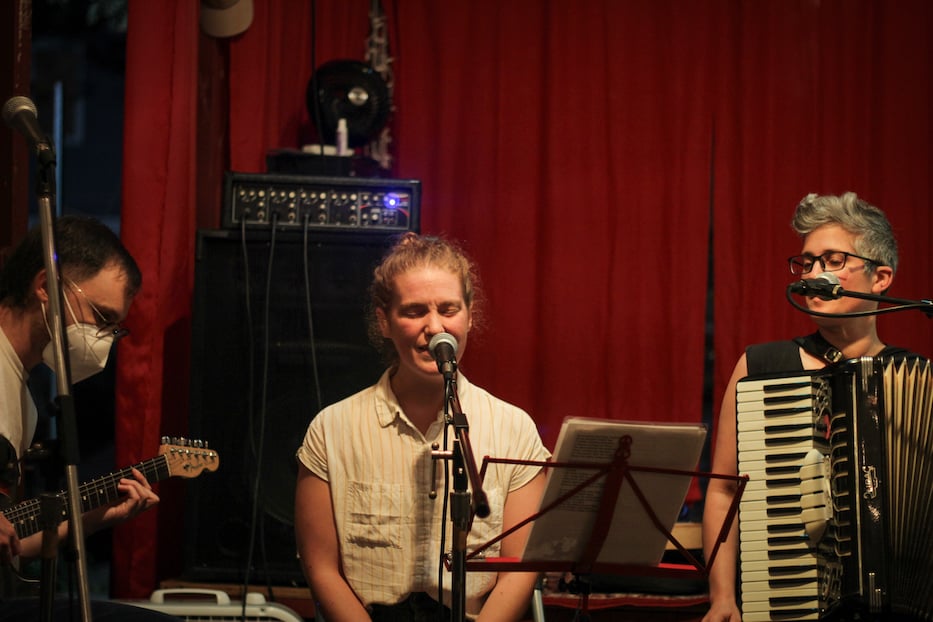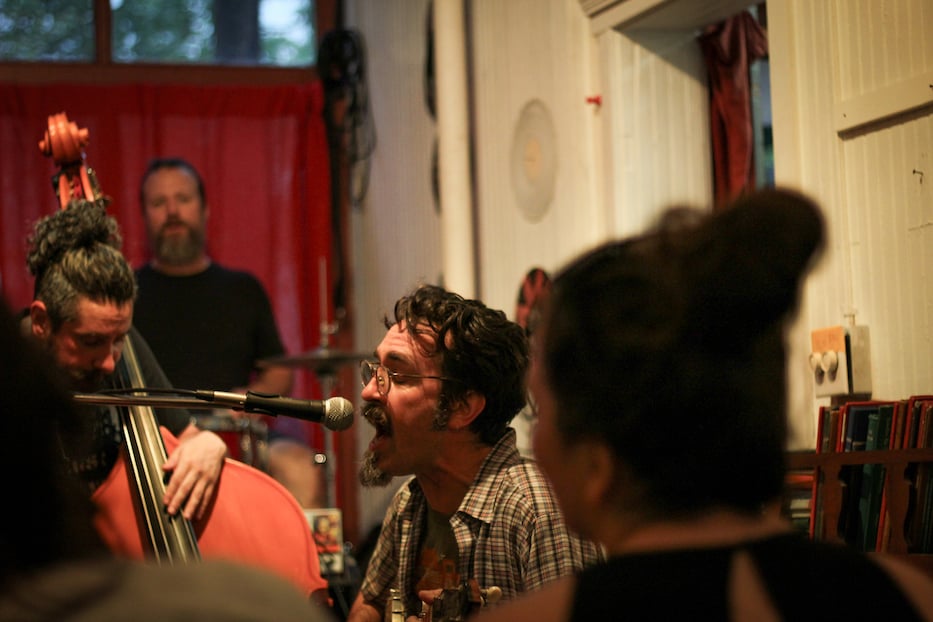
Ross Kirshenbaum, Maia Brown and Stefanie Brendler of Brivele. Kapp Singer Photos.
A dense collage of Yiddish and English lyrics filled the narrow room. The bellow of an accordion pulled sounds of the tenement, sounds of the Pale, and sounds of the turn-of-the-century labor movement into the present. When Maia Brown gestured to the audience, attendees joined in with their own lai-lai-lais.
Last Thursday evening, Volume Two: A Never Ending Books Collective hosted the Seattle-based klezmer trio Brivele at its 810 State St. home, on a triple bill that also included Dr. Caterwaul’s Cadre of Clairvoyant Claptraps and Levoneh, the stage name of solo musician Ross Kirshenbaum. They played a diverse, genre-bending set, from canonical American tunes translated into Yiddish to anarcho-socialist Yiddish poetry translated into song.
Brivele is made up of Brown (vocals and banjo), Stefanie Brendler (vocals and accordion) and Kirshenbaum (guitar, temporarily taking the place of member Hannah Hamavid). New Haven was the third stop of the band’s East Coast tour, which will conclude in Quebec for the annual klezmer festival KlezKanada.
“We really think about the way that we approach this music and this lineage as a kind of correspondence,” Brown said. “For some of us, that’s an uninterrupted, continuous, proud radical Yiddishist, socialist, anarchist lineage, and for others it needs a little bit more healing and a little bit more care to return to what has been lost and what has been explicitly and violently taken from us, either by virtue of fascism in Europe or fascism here, and also from the ways that white supremacy teaches us to walk away from the things that are important.”
Throughout the evening, the band played through that mission. Brown and Brendler performed their rendition of the jazz standard “Summertime” as “Zumertsayt,” swapping the gentle piano and cello of George Gershwin’s recording for Brendler’s sonorous, dissonant accordion and Kirshenbaum’s distorted electric guitar. They gave new voice to Bruce Springsteen’s bombastic love ballad “Everybody’s Got a Hungry Heart,” singing “Yeder eyner hot a hungerik harts” (the track appears on their first album as “Hungry Yid”).
As dusk approached, the band offered their take on the poem “Der arbetlozer redt tsum kind vegn zun-fargang” (“The Man Who is Out of Work Talks to His Son about the Sunset”) by the Yiddish-speaking American poet L. Miller. Brown learned of the poem while reading Amelia Glazer’s book Proletpen: America’s Rebel Yiddish Poets and knew she had to put it to music.

Dr Caterwaul's (pictured is Brian Slattery, who is also the arts editor at the New Haven Independent).
The piece began slow and somber, with Brown describing the man’s lament that his boss will try to profit off even the sun and the flowers. But as the arc of the poem turned to describe the overwhelming, sublime feeling of watching the swirling colors of the twilight—“How they turn and change / ‘til your head spins about,” Brown sang in Yiddish—Brendler’s accordion picked up steam.
Even as the song ended by describing a mother who “sews and sews and sews / and can’t afford a decent dress,” Brivele’s delicate harmonies seemed to fill the room with hope.
“That melody just came to me,” she said, “I had been reading the poem over and over again because I was so taken by it.”
“We’re indebted to so many scholars,” Brown added, explaining that much of the band’s inspiration comes from spending significant time in various Yiddish archives. The band’s creative and interpretative work—covers, mashups, translations—gestures at the complicated, contested history of Jews in America, begging audience members to reflect on the very nature of cultural preservation and assimilation. All the while, their songs take up the long tradition of Jewish anarchism and socialism.
The name Brivele comes from the Yiddish word meaning “little letter,” and with their music, the group seeks to speak across cultural boundaries and between past and present. “When we sing, it feels like a way of writing back to ancestors and also inviting audiences to do that too,” Brown said.
Brivele ended up at Never Ending Books by the recommendation of Adam Matlock, the synth and accordion player for Dr. Caterwaul’s, whom Brown met at KlezKanada. But the band probably would have stumbled upon the State Street space anyways: “We always look for anarchist spaces and nerdy bookstores—those are our favorite places,” said Brown.
Over the course of the night, musicians and audience members alike enjoyed free pizza and beer. Among a sea of shelves overflowing with pay-what-you-want books, Brivele concluded with a classic socialist ballad: “For the people hear us singing, bread and roses! Bread and roses!”
Bread and roses were indeed to be had.